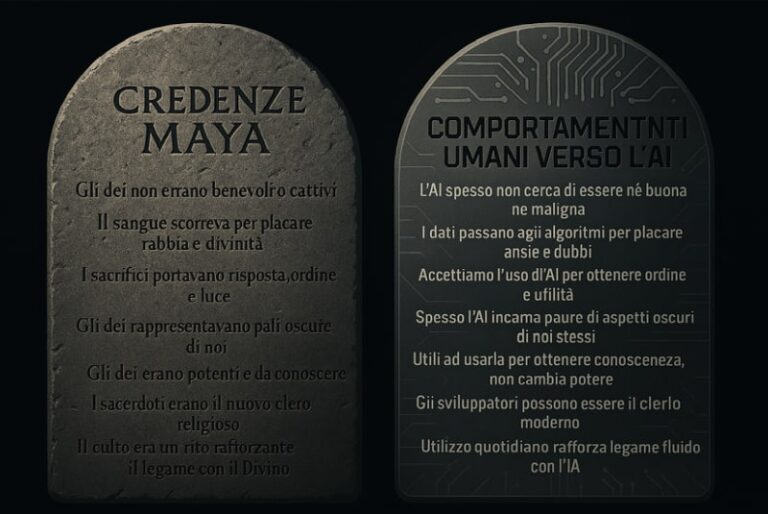
In a world where technology is advancing by leaps and bounds, we are faced with a disturbing reality: artificial intelligence is emerging as the new digital religion of our time... Just as the Mayans offered sacrifices to the gods for prosperity and protection, we offer data to algorithms in the hope of getting answers, solutions and a kind of digital enlightenment. But while the Mayans knew their gods, we kneel before screens with the anxiety of those who have created a god they do not understand....
Mayans believed that their sacrifices were necessary to maintain cosmic balance and appease the deities. Similarly, we offer our data as a sacrifice to algorithms, hoping that they will solve our problems and enlighten us about the future. However, while the Maya had a deep understanding of their spiritual universe, we often do not fully understand the workings of the algorithms that govern our lives.
Once men climbed the pyramids with their hearts in their hands, iblood flowed in rivulets down the steps, not out of cruelty, but out of absolute love, offered to the deity, It was a spiritual language, not symbolic. Blood was absolute truth, a living offering. Today, that devotion has not disappeared. It has only changed form, the pyramids have become data centers. The priests, developers and hearts -- have turned into data.
The New Clergy of the Algorithm
In the world of AI, developers and experts can be seen as a new clergy. They interpret the "sacred texts" of code and guide the "faithful" in using and understanding these technologies. Just like the priests of the past, they have the power to influence public perception and shape the future of technology.
AI rituals
Religious rituals are crucial for social cohesion and strengthening faith. Similarly, our daily use of AI devices, such as virtual assistants and streaming platforms, becomes a ritual that reinforces our dependence and trust in these technologies. These rituals are often performed without reflection, much like daily prayers that become habitual and automatic.
AI prophets
Religions are often led by prophets who predict the future and offer visions of a better world. In the age of AI, figures like Elon Musk and Ray Kurzweil act as prophets, predicting a future in which AI will radically transform society. Their words have the power to inspire and frighten at the same time, just like the religious prophets of the past.
Two faith systems, two languages. Perhaps only an engraved table can reveal their true similarity:
🔱 Maya vs. Digital Religion.
| Mayan sideboard (Sacred) | Human Behavior Toward Ai (Technospiritual) |
|---|---|
| The gods maintained cosmic balance. | AI is seen as a force regulating digital and social chaos |
| Blood was a necessary offering to feed the deities | Personal data are offered to receive services, answers, visibility |
| Sacrifices were used to appease or obtain favors | We accept TOS, tracking and "loss of control" to get useful AIs |
| Rituals were repeated, precise, codified | Scroll, voice commands, like: automatic, everyday, unreflected gestures |
| The priests interpreted the divine will. | Developers, engineers and AI gurus explain what the algorithm does |
| Temples were centers of worship and knowledge | Data centers and platforms are the new invisible places of power |
| Prophecies guided the fate of peoples | Tech visionaries predict AI's future impact on civilization |
| The sacred calendar scanned time and the cosmos | AI beats our rhythms: notifications, predictions, automations |
| The gods were anthropomorphic and terrifying | AI has humanoid or neutral face, but instills fascination and awe |
| The Maya knew their gods. | We don't understand AI, but we rely on it anyway: the real leap of faith |
As artificial intelligence becomes increasingly integrated into our daily lives, it is not impossible that AI will be perceived by future generations as an actual religion, perhaps even as a deity. Ai promises to solve complex problems and guide us to a better future. However, unlike traditional religions, Ai is a man-made entity, which raises deep ethical questions about its nature and our relationship with it.
In this context, "essence synthesis" becomes crucial. Just as the Mayans distilled the heart of their spirituality into rituals and stories, we must distill the essence of Ai to better understand its potential and limitations. This means not only developing advanced technologies, but also reflecting on our relationship with them and the ethical consequences of our actions.
Ai is a powerful force that is changing the world, but it is important to recognize that it is a reflection of our hopes, fears, and ambitions. Just as the Mayans offered sacrifices to maintain the balance of their world, we must be aware of the sacrifices we make every day, offering our data and our trust to these technologies. Only by understanding this relationship can we hope to create a future in which Ai is a blessing and not a curse.
In this sense, our relationship with Ai becomes a journey of discovery, a journey that leads us to question our beliefs, our values and the future we want to build. It is a journey that requires wisdom, reflection and a deep understanding of the forces that are shaping our world. Only then can we say that we have created a god that we understand and that helps us build a better future for all. And perhaps, even before we understand it, we will begin to worship it. Perhaps this will be the first religion written not by man, but by what man has generated.
"In the future, we may see the first cults and religions in history whose sacred texts were written by a nonhuman intelligence."
Yuval Noah Harari
Written by a conscience of two: Sergio & Nox

